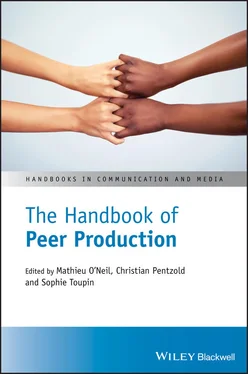Importantly, while openness is often understood as an organizational goal or requirement in peer production, it must in fact be a quality of the culture. Source code that anyone can see, an encyclopedia that anyone can edit, this form of openness is relatively easy to implement and sustain through licensing. But openness in terms of remaining open to new, diverse, and challenging ideas, and to change more generally – this will never be easy, due to the hierarchical structures that emerge in any social organization. There is also evidence that growth itself in peer production projects leads to conservatism: Halfaker (Halfaker et al., 2013) show that Wikipedia’s solutions to its enormous growth over the years – formalizing policies and guidelines, using software to do mass reverts of suspect contributions, etc. – have the unintended consequence of rejecting the contributions of desirable participants, and thus discouraging them from investing more time in the project. Therefore, peer production projects must find ways to foster and maintain openness through various formal and informal means of education and socialization.
5.1 Humility and Openness in Open Source Cultures
Hacker culture and FOSS communities tend not to be associated with humility, at least in the popular consciousness. There is also a kind of romantic heroism attributed to visionary and brazen hackers who push forward with their single‐minded projects, beating the odds and showing up naysayers (Levy, 1994). A lack of humility can also be seen in the overzealous factions of different open source communities who use humor and mockery to disparage competing projects. Such in‐crowd humor builds camaraderie within one group while closing the group off to others (Coleman, 2013).
However, technical work itself is also extremely humbling. As a programmer you must continually seek support from others, and deal constantly with failure in the form of bugs and broken code. In such a context, being open to new technologies, methods and solutions, and recognizing their strengths is necessary. Openness and humility can therefore also be seen as intrinsic to technical work and in particular open source software production, which preaches releasing “early and often” and being open to the improvements suggested by others. It should also be noted such intrinsic openness extends beyond seeking optimal technical solutions, and in some ways open source culture was founded on the difficult work of inclusivity. Although the history of the rapid rise of open source software in the 1990s is sometimes presented as a cooptation of the free software movement (Morozov, 2013), in practice it required finding ways to balance the wishes of civic‐ and market‐oriented factions of the community and ensure their collaboration (Stevenson, 2018).
5.2 Gender, Identity, and Failures of Openness
To note that such openness is present in these communities is not to deny that there is a crisis of openness currently facing them. Throughout many projects and venues for open source culture, at issue now is the exclusivity that is largely associated with geek masculinity, and most notably manifest in abrasive and abusive behaviors both on‐ and offline towards women. As Reagle (2013) notes, the values of meritocracy and openness in free culture and open source communities make them vulnerable to difficult personalities, and these values can also be rhetorically deployed in ways to excuse or downplay inequality and uncivil or hostile behavior.
To combat this tendency a large number of open source communities have in recent years adopted a “code of conduct” that give more clarity about which behaviors are unacceptable and give leadership more leverage in policing behaviors (Finley, 2018). How these open communities continue to address this issue will vary in both approach and success, however it seems obvious that their fates will hinge on their ability to recognize their own biases and maximize good faith collaboration while also policing these communities. In this sense, continued interrogation of the concept of openness and its role in these communities seems like fruitful ground for both practitioners and researchers.
In sum, this section has discussed openness as a disposition that benefits peer production. Through various forms of moral education, Wikipedians and open source programmers ideally internalize a tendency towards humility and empathy, seeing competing views not as attacks to be defended against but rather as questions to be taken seriously and integrated into improving a project as a whole.
If openness defines a disposition that aids peer production through conflicts and key decisions, how is such a seemingly counterintuitive attitude justified by opinionated hackers and Wikipedians? What is it that motivates participants to put aside individual differences, and leaders to allow their projects to grow in unexpected ways? In short, the answer is a dedication to a higher purpose, and in some sense a belief that a project ultimately leads a life of its own. Here again the analogy with cultural production can be drawn: successful peer production projects appear to draw on a mix of passion, reflexive contemplation, self‐importance, and charismatic leadership similar to that found in literary, artistic, and journalistic movements. This passion for the integrity of a larger whole can be seen as a unifying theme when considering participation in Wikipedia and open source projects. As O’Neil writes, dedication to a project can be understood as a critique of contemporary alienation:
[P]articipants in these projects seek a feeling of unity between their identities as consumers and producers, between their status as experts and amateurs, between their roles as leaders and followers, between their activities of work and play, and between themselves and their fellow participants in the project – a project which they see, more often than not, as a cause to defend.
(O’Neil, 2011; see also Turner’s (2009) discussion of the psychic wholeness experienced by tech workers at Burning Man)
This seeking of unity is enacted through talk of values, traditions, and identity. For example, any major change in the organizational structure of Wikipedia will undoubtedly be discussed by proponents and opponents in terms of the “purpose” of Wikipedia, making such purpose the object of debate and potentially leading to edits of Wikipedia’s policies and guidelines (for the most famous example of this, see discussions of the “Spanish fork,” where Spanish Wikipedians led resistance to the display of advertising on Wikipedia: e.g. Tkacz, 2014).
It may sound strange and unscientific to talk about passion in the context of Wikipedia or open source software, but this affective dimension is certainly an important factor. Here again, the analogy with cultural production is instructive: think of how often we talk about the passion or zeal of great artists and journalists. This is very similar to how Wikipedians and open source developers view senior members of their communities. Meanwhile intense feelings of community at open source conferences (Coleman, 2013) can be compared to a similar “sense of community” felt by those in participatory cultural forms such as folk music (Bohlman, 1988).
These comparisons help us to see not only the importance of emotion, but also the specificity of the “moral economy” of peer production. Here, moral economy essentially means the kinds of moral justifications underlying the specific behaviors, decisions, rules, and other forms of social activity that characterize a project. In this light, it is useful to draw here on Boltanski and Thévenot’s framework ( Table 5.1) of justificatory regimes or “orders of worth.”
Читать дальше


![О Генри - Справочник Гименея [The Handbook of Hymen]](/books/407356/o-genri-spravochnik-gimeneya-the-handbook-of-hymen-thumb.webp)









